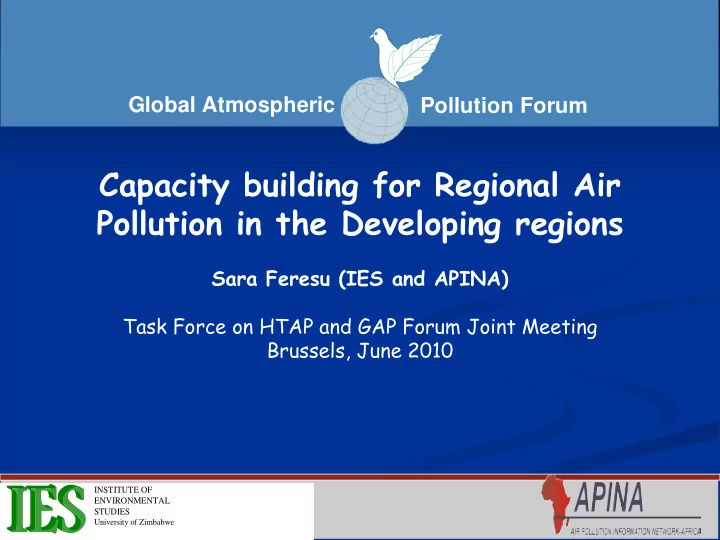

Global Atmospheric Pollution Forum Capacity building for Regional Air Pollution in the Developing regions Sara Feresu (IES and APINA) Task Force on HTAP and GAP Forum Joint Meeting Brussels, June 2010 INSTITUTE OF ENVIRONMENTAL STUDIES University of Zimbabwe
Capacity Building – what do we mean? Global Atmospheric Pollution Forum Developing Human Capacity • scientific community (enhance expertise in different individual subject areas) - Emission inventories - Atmospheric transfer modelling - Deposition Monitoring - Impacts (health, crops, ecosystems, structural materials) - cost benefit analysis - air quality and integrated assessments - Urban Air Quality Management (AQM) - Decision making support information etc. www.gapforum.org
Capacity Building – what do we mean? (cont) Global Atmospheric Pollution Forum Developing Human Capacity • specific stakeholders (e.g. Polluting sectors) • policy and decision makers (informing and enthusing them) – local, national, regional • general public www.gapforum.org
Capacity Building – what do we mean? (cont) Global Atmospheric Pollution Forum Developing institutional capacity • Strong scientific institutions • National government capacity • Regional institutional capacity www.gapforum.org
Capacity Building – Differentiation of capacity building needs • Capacity building needs are not uniform among regions and within the different regions; • Can consider 3 levels of capacity, each with different needs, but nowhere is there capacity comparable with N America or Europe. Asia Africa Latin America Level 1 India South Africa Brazil China Botswana Chile Thailand Egypt Mexico Level 2 Vietnam Tunisia Argentina Iran Nigeria Venezuela Pakistan Kenya Level 3 Nepal Malawi Bolivia Bhutan Mozambique Caribbean Cambodia Cameroon Peru www.gapforum.org
Capacity Building – What are major issues? Global Atmospheric Pollution Forum • Governments do not prioritize environmental issues (lack of capacity and funding in environment ministries and institutions - few issues are considered; initiating activity in a new field of environmental is difficult) • Atmospheric issues are cross-cutting and fall between priorities of different government ministries • Government officials do not understand the linkages between atmospheric issues and health, poverty and development
Capacity Building – What are major issues? Global Atmospheric Pollution Forum (cont) • Donors do not understand the linkages between atmospheric issues and health, poverty and development (and climate change!) • This results in short-term projects which are vulnerable to changes in donor priorities – e.g. shift to climate issues • Decreasing emphasis on funding regional projects by many donors - Now focussing on bi-lateral funding
Capacity Building – Suggested Approaches Global Atmospheric Pollution Forum COOPERATION Regional approach to capacity building • Opportunities to make best use of limited resources • Stronger countries in a region should train others • The poorer countries in a region need to be encouraged to participate, rather than concentration of effort in more advanced countries • Networking • Information access, sharing (platforms and forums) and exchange South – South Cooperation North - South Cooperation Intergovernmental Cooperation – Global Agreements www.gapforum.org
Capacity Building – Suggested Approaches Global Atmospheric Pollution Forum (cont) SUSTAINABILITY AND OWNERSHIP Long-term development of capacity • Sustainability of capacity building in the countries and regions • Creation of centres of excellence in the regions • Incorporation of atmospheric issues into education • Long-term engagement (long-term partnerships with institutions and donors) www.gapforum.org
Capacity Building – Suggested Approaches Global Atmospheric Pollution Forum (cont) LUBRICATING THE PROCESS • Funding Steams -National -Regional -International www.gapforum.org
Recommend
More recommend